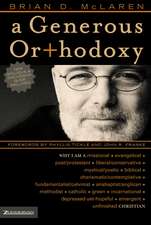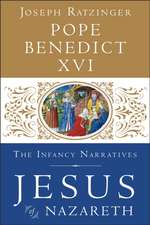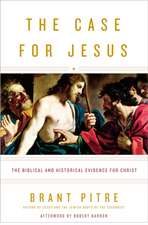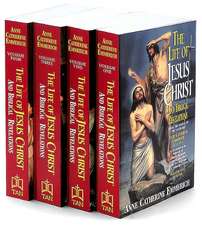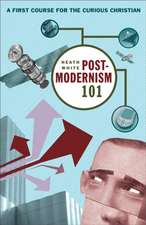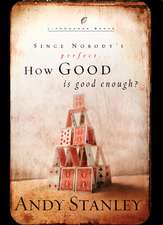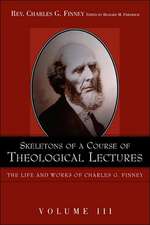Trinity
Autor Joseph F. Girzoneen Limba Engleză Paperback – 31 ian 2004
With Trinity, Joseph Girzone guides readers to a deeper understanding of this foundational concept, explaining why it is not antiquated theological dogma, but a living expression of the very essence of God. He offers support and clarity to those who already believe in God, and invites those who profess not to believe on a journey to find “an image of a God who is believable, and perhaps, even lovable.”
For centuries, Christians have struggled to understand the nature of God as three persons in one. But with grace similar to that which allowed Saint Patrick to explain the Trinity by using a shamrock, Girzone takes a step back from the most arcane explanations to offer a simple, useful understanding. He begins by showing the ways God was perceived by the ancient Hebrews and reveals how Jesus forever changed that image of God. As he chronicles the growth from the time of Jesus and the early Church, writing about the challenges Christianity faced from both within and without, Girzone elucidates the mysterious ways the Trinity works in the world and especially, in the Church, as an extension of Jesus’ presence in history. Writing with passion and insight, he helps readers understand how the Father, the Son, and the Holy Spirit work within individuals as well, guiding them as they struggle along the pathways of life on Earth.
From the Hardcover edition.
Preț: 82.89 lei
Nou
Puncte Express: 124
Preț estimativ în valută:
15.87€ • 17.24$ • 13.34£
15.87€ • 17.24$ • 13.34£
Carte disponibilă
Livrare economică 31 martie-14 aprilie
Preluare comenzi: 021 569.72.76
Specificații
ISBN-13: 9780385504584
ISBN-10: 0385504586
Pagini: 144
Dimensiuni: 140 x 212 x 8 mm
Greutate: 0.15 kg
Editura: IMAGE
ISBN-10: 0385504586
Pagini: 144
Dimensiuni: 140 x 212 x 8 mm
Greutate: 0.15 kg
Editura: IMAGE
Recenzii
Praise for Joseph Girzone:
“Girzone draws on the wisdom of the centuries, writing [with] humanity and spirit.” –Kirkus Reviews
“Girzone focuses on the heart of the matter, the truth of the Gospel, the revelations of the heart, and people relate to his words, respond to his wisdom, read his books, and beg for more.” –The Catholic Times
From the Hardcover edition.
“Girzone draws on the wisdom of the centuries, writing [with] humanity and spirit.” –Kirkus Reviews
“Girzone focuses on the heart of the matter, the truth of the Gospel, the revelations of the heart, and people relate to his words, respond to his wisdom, read his books, and beg for more.” –The Catholic Times
From the Hardcover edition.
Extras
One
God the Creator
It was the second day of Christmas, and, even though his coming warmed our hearts, it was very cold outside. The fire in the fireplace I built not only for atmosphere but to warm the chill inside. Sitting before the fire, I soon became mesmerized by the darting flames burning brilliantly, though soon the intense heat forced me to move farther back for comfort. Staring at the flames, I noticed how they not only warmed the room but cast their luminous spell all across the foyer.
I was immediately reminded of God. There was the fire, and the light that comes from the fire, casting its mystic glow throughout the room, and the warmth that comes from the fire through the flames, warming every object around it. Yet the flames were not the fire, nor was the heat the flames. The three were distinct, but they were inseparable, save for how they each affected me. The light and the heat touched me immediately. The source of the fire was present but could not be seen.
My memory wandered back many years, to one evening when I was baby-sitting my lawyer's children, Joe, John, and Peter. Richard and Elizabeth Della Ratta had asked me to mind the boys until they returned. At bedtime, as I tucked in the little ones, Peter said to me, "Fahd, I have a problem with God."
"Pete, you're only six years old. How can you have a problem with God?"
"But, I do, Fahd."
"How come you only have problems when you're going to bed?"
"It's the only time I have to talk to you."
"Okay, Pete, what's this big problem you have with God?"
"Fahd, when you tell me about God, you talk about God as our Father, and you talk about Jesus, and you also talk about . . . the . . . you know, the other guy."
"The Holy Spirit."
"That's right. Now, you talk about these three people, and you tell me there is only one God. If there are three of them, how can there be only one God?"
"Pete, God is not like us humans. God's nature is different. See that lamp there? There is the bulb, there is the light coming from the bulb, and there is heat coming through the light from the bulb. They are all different, but you can't separate them. They're all together as one. That is something like what God is like."
"But, Fahd, God doesn't work on electricity."
"Pete, why don't you just close your eyes and think about it? I'm sure it will put you right to sleep."
As I went back downstairs I thought, "How young we are when we begin to question about God. We humans are born philosophers, with a thirst to understand our existence. I suppose once we experience the vastness of the world and all the complicated beings in it, it is only a simple next step to ask ourselves where it all came from, and who made it, and then the whole train of questions that logically follow.
Now as I sit before the fire in my study, my mind wanders back to Moses and his experience with the burning bush, the bush that burned but was not consumed. I am sure the voice he heard that day haunted him all his life. "Moses, come no closer! Take off your shoes, for the ground on which you stand is holy ground! I am the God of your fathers, the God of Abraham, the God of Isaac, and the God of Jacob."
God then goes on to tell Moses that he is concerned about his people in Egypt, and how they are sorely hurting from the cruelty of their slave drivers. Interesting. I sometimes have a problem with how so many people view the Bible as inspired. I have no doubt that God's inspiration guided each author to write, but as to what God intended people should accept as inspired is perplexing. Some say each word is inspired. Others who are familiar with the history and literary forms of the Bible's books have a more open understanding of inspiration. That something happened to Moses on Mount Horeb that day, when he saw the burning bush and heard the voice of God, I have no doubt. What is so thought provoking about that incident is that Yahweh showed concern for his people suffering so harshly in Egypt. That speaks volumes. The idea alone of God communicating with a creature is stunning. But the age old question "Does God really care?" is answered in that scene. A new facet of God. And if one can readily accept as historically true that Moses did experience the presence of God that day, and if one can be convinced of God's concern for his human creatures, that can form a solid basis for one's concept of God. That God does care for us I have never doubted, in spite of all the confusing, tragic events that take place in our lives. However, it is difficult for many to believe, or be convinced: that God really cares. This was brought across to me rather dramatically one evening in Switzerland.
Seven years ago, our dear friends, Bill and Anna Belle Bru, invited Sister Dorothy and me to Switzerland to speak to a group of their friends. When we arrived at their chateau, we were surprised that half of the group of 150 people were atheists or agnostics. The night before the talk, we were invited to a formal dinner at the home of one of their friends. There were a number of important people there, among them Jan Martensen, the Swedish ambassador to Switzerland. He had also been the Undersecretary General of the United Nations. Jan was a delightful individual, and we parted feeling very close to each other, though it did not start out that way.
As we were sitting down to dinner, Jan was the last to take his seat. As he sat down, he made the remark, out of nowhere, "I can't understand why anybody would worship a God who allows all the evil in the world to take place."
Sister Dorothy was sitting way down at the other end of the long table. She signaled me to keep my cool and say nothing. But I knew Jan was expecting me to react, from a brief exchange we had a few minutes earlier.
No sooner had Jan got the words out, than everyone's eyes went down toward their soup. No one wanted to get involved in that issue. Everyone sensed that statement was directed to me. At first I said nothing. Then Jan continued. "I have an even more difficult time understanding why anybody would dedicate their whole life to a God like that."
Well, I knew Jan was not being nasty. He was genuinely grappling with a problem that had tortured him all his life, and no one was interested in his question or able to give him a believable answer, and I felt he was merely throwing out the issue for someone to come up with an answer that made at least some sense.
I said, "Jan, the problem you have, and others like you, is that you really don't believe that free will is a good thing."
"What do you mean by that?"
"Very simply. God must have thought a long time before he finally decided to give his human creatures freedom to make their own decisions. Once he did that, he was stuck with all our nonsense and abuse of freedom. You, and others like you, would have God continually interfere in human decisions to prevent people from doing evil, so we could have an evil-free world. God, fortunately, has more respect for our freedom than that."
That response, however, did not sway Jan. "Why is there so much injustice and hunger and poverty in the world, and so much suffering?" he continued.
"Jan, why do people have to blame God for that? Suppose you were a multibillionaire and while traveling on safari you came across a group of people in a forsaken place. They were poor, hungry, ravaged by disease. You felt sorry for them, but knowing you could not stay there, you picked a few highly intelligent and educated persons among them and gave them directions on how to save their community. You made arrangements to give them hundreds of millions of dollars to accomplish the task. Then you left.
"After your departure, the persons you entrusted with the task thought to themselves 'Why should we waste all this money on those people? They are only rabble anyway. With this money we are wealthy beyond our dreams. Let us keep the money for ourselves,' which is what they did.
"When the rest of the community saw what had happened, could they blame the kind rich man for not helping and healing them?"
Jan agreed it would not be reasonable to place the blame on him.
"That is what God is like. He has blessed us with resources far beyond what the world needs, so that we could care for one another. Is it right to blame God for the greed and selfishness of those who have so much and refuse to share? And if the world's diplomats could get their own hearts in the right place, they could do much to bring the rich and the powerful together to solve the problem of starvation and injustice."
Even that did not deter Jan. The frightful issue had haunted him for too much of his life to lose this chance to possibly find an answer.
After letting him speak for a while, I said, "Jan, you amaze me."
"What do you mean?"
"I am a priest. I write books. Yes, I believe in God. I pray in my own simple and inadequate way, and I try to say nice things about God in my writings, but I sense that I spend nowhere near the time thinking about God that you do, this God in whom you say you do not believe. Jan, I do admire you. And I am sincere in saying that. Most people, when they come across the idea of evil in the world, are so overwhelmed by the thought, they put it out of their minds and refuse to think about it ever again. But you have hung in there all these years, and are still struggling to understand God. You're a rare human being, Jan. I admire you for it."
"Father, I like you," he said with a broad grin. "I came to the dinner tonight so I wouldn't have to go to your talk tomorrow, but I'll be there."
With that matter settled, the dinner was delightful and we all had a most enjoyable time. The rest of the guests even enjoyed the unexpected entertainment.
After dinner Jan took me aside and said, "Father, I have been to so many formal state dinners, often with the diplomatic corps and Vatican officials. I have to tell you, the Vatican diplomats are brilliant. You can tell they are the only ones who are professionally trained for their work. But in all the years I worked with them, not one of them ever talked to me about God."
I could feel his painful disappointment.
The next day, after the talks that Sister Dorothy and I gave about Jesus, I hadn't noticed Jan until I walked through the crowd. A man grabbed my arm. I looked down. It was Jan. He had tears in his eyes. What a beautiful, peaceful smile he had on his face. All he said was, "Thank you, Father. Thank you so much." Then he worked his way through the crowd to find Sister Dorothy to say good-bye. I was deeply moved by the depth and honest goodness in that man. I would have liked to have had him as a friend. I regret that we have not kept in touch.
To me, Jan was a symbol of modern man and woman, cultured and highly intelligent, searching for a god in whom they can place reasonable belief, not a bourgeois god made to man's image and likeness, with all the faults, limitations, and prejudices common to humans, but the God who made sense to a person who was searching with an honest mind. And there is nothing wrong with that searching, for even Saint Peter encouraged the early Christians to "find a reason for your faith." Nor is it meant that God has to make "sense" in our worldly meaning of the word. God will never make sense in that way, for God's ways are far beyond the ability of the human mind to ever begin to understand. It is therefore impossible to find God through reason alone. Faith is first of all a gift. God may reward our search for him and allow us to find him at the end of our search, but it is not our search that found him. It is his gift at the end of our search that opens our hearts to embrace him, though not everyone receives this gift. And even though many may spend their whole lives searching for him and not find him, that does not mean that they are alienated from God. God is aware of their painful search. God has need of those people to witness to him in other ways. They are still doing his special work in their lives, though they may never realize it. They are close to God as long as they never give up the search. For them, their search is credited to them as faith as Abraham's obedience was credited to him as faith, and as such will be ultimately rewarded.
One summer after my ordination, I took some courses at Columbia University. One day my physics professor and I were on the elevator together. He remarked to me, "Father, I envy you Catholics. You are such a happy lot. I see all the other students crowding around you after class, wanting to spend time with you. Most of them are Jewish, like myself, and they seem to have so much fun when they are with you. I was born and raised in South Africa. I went to a Jesuit university and studied Catholic philosophy and theology, hoping that I could find faith, but it has always eluded me. I prayed so hard for faith, but I never found it. Why can't I believe? How does one get faith?"
I looked at him and felt sadness in my heart for the anguish that pained him so deeply. All I could say was, "I guess faith must be a gift, but God rewards our searching." Unfortunately, the elevator reached our floor and after we parted, our relationship went back to that of professor and student. I guess the privacy of the elevator was something like the confessional, where deeply private thoughts can be shared and painful burdens momentarily shed. I would have liked to have had a chance to share with him and have allowed him to share with me each of his experiences, as I would have shared mine as well. Sometimes it can be a great comfort just to share. It can give us insights into the various and mysterious ways God works through each of us, while loving us all with remarkable tenderness.
From the Hardcover edition.
God the Creator
It was the second day of Christmas, and, even though his coming warmed our hearts, it was very cold outside. The fire in the fireplace I built not only for atmosphere but to warm the chill inside. Sitting before the fire, I soon became mesmerized by the darting flames burning brilliantly, though soon the intense heat forced me to move farther back for comfort. Staring at the flames, I noticed how they not only warmed the room but cast their luminous spell all across the foyer.
I was immediately reminded of God. There was the fire, and the light that comes from the fire, casting its mystic glow throughout the room, and the warmth that comes from the fire through the flames, warming every object around it. Yet the flames were not the fire, nor was the heat the flames. The three were distinct, but they were inseparable, save for how they each affected me. The light and the heat touched me immediately. The source of the fire was present but could not be seen.
My memory wandered back many years, to one evening when I was baby-sitting my lawyer's children, Joe, John, and Peter. Richard and Elizabeth Della Ratta had asked me to mind the boys until they returned. At bedtime, as I tucked in the little ones, Peter said to me, "Fahd, I have a problem with God."
"Pete, you're only six years old. How can you have a problem with God?"
"But, I do, Fahd."
"How come you only have problems when you're going to bed?"
"It's the only time I have to talk to you."
"Okay, Pete, what's this big problem you have with God?"
"Fahd, when you tell me about God, you talk about God as our Father, and you talk about Jesus, and you also talk about . . . the . . . you know, the other guy."
"The Holy Spirit."
"That's right. Now, you talk about these three people, and you tell me there is only one God. If there are three of them, how can there be only one God?"
"Pete, God is not like us humans. God's nature is different. See that lamp there? There is the bulb, there is the light coming from the bulb, and there is heat coming through the light from the bulb. They are all different, but you can't separate them. They're all together as one. That is something like what God is like."
"But, Fahd, God doesn't work on electricity."
"Pete, why don't you just close your eyes and think about it? I'm sure it will put you right to sleep."
As I went back downstairs I thought, "How young we are when we begin to question about God. We humans are born philosophers, with a thirst to understand our existence. I suppose once we experience the vastness of the world and all the complicated beings in it, it is only a simple next step to ask ourselves where it all came from, and who made it, and then the whole train of questions that logically follow.
Now as I sit before the fire in my study, my mind wanders back to Moses and his experience with the burning bush, the bush that burned but was not consumed. I am sure the voice he heard that day haunted him all his life. "Moses, come no closer! Take off your shoes, for the ground on which you stand is holy ground! I am the God of your fathers, the God of Abraham, the God of Isaac, and the God of Jacob."
God then goes on to tell Moses that he is concerned about his people in Egypt, and how they are sorely hurting from the cruelty of their slave drivers. Interesting. I sometimes have a problem with how so many people view the Bible as inspired. I have no doubt that God's inspiration guided each author to write, but as to what God intended people should accept as inspired is perplexing. Some say each word is inspired. Others who are familiar with the history and literary forms of the Bible's books have a more open understanding of inspiration. That something happened to Moses on Mount Horeb that day, when he saw the burning bush and heard the voice of God, I have no doubt. What is so thought provoking about that incident is that Yahweh showed concern for his people suffering so harshly in Egypt. That speaks volumes. The idea alone of God communicating with a creature is stunning. But the age old question "Does God really care?" is answered in that scene. A new facet of God. And if one can readily accept as historically true that Moses did experience the presence of God that day, and if one can be convinced of God's concern for his human creatures, that can form a solid basis for one's concept of God. That God does care for us I have never doubted, in spite of all the confusing, tragic events that take place in our lives. However, it is difficult for many to believe, or be convinced: that God really cares. This was brought across to me rather dramatically one evening in Switzerland.
Seven years ago, our dear friends, Bill and Anna Belle Bru, invited Sister Dorothy and me to Switzerland to speak to a group of their friends. When we arrived at their chateau, we were surprised that half of the group of 150 people were atheists or agnostics. The night before the talk, we were invited to a formal dinner at the home of one of their friends. There were a number of important people there, among them Jan Martensen, the Swedish ambassador to Switzerland. He had also been the Undersecretary General of the United Nations. Jan was a delightful individual, and we parted feeling very close to each other, though it did not start out that way.
As we were sitting down to dinner, Jan was the last to take his seat. As he sat down, he made the remark, out of nowhere, "I can't understand why anybody would worship a God who allows all the evil in the world to take place."
Sister Dorothy was sitting way down at the other end of the long table. She signaled me to keep my cool and say nothing. But I knew Jan was expecting me to react, from a brief exchange we had a few minutes earlier.
No sooner had Jan got the words out, than everyone's eyes went down toward their soup. No one wanted to get involved in that issue. Everyone sensed that statement was directed to me. At first I said nothing. Then Jan continued. "I have an even more difficult time understanding why anybody would dedicate their whole life to a God like that."
Well, I knew Jan was not being nasty. He was genuinely grappling with a problem that had tortured him all his life, and no one was interested in his question or able to give him a believable answer, and I felt he was merely throwing out the issue for someone to come up with an answer that made at least some sense.
I said, "Jan, the problem you have, and others like you, is that you really don't believe that free will is a good thing."
"What do you mean by that?"
"Very simply. God must have thought a long time before he finally decided to give his human creatures freedom to make their own decisions. Once he did that, he was stuck with all our nonsense and abuse of freedom. You, and others like you, would have God continually interfere in human decisions to prevent people from doing evil, so we could have an evil-free world. God, fortunately, has more respect for our freedom than that."
That response, however, did not sway Jan. "Why is there so much injustice and hunger and poverty in the world, and so much suffering?" he continued.
"Jan, why do people have to blame God for that? Suppose you were a multibillionaire and while traveling on safari you came across a group of people in a forsaken place. They were poor, hungry, ravaged by disease. You felt sorry for them, but knowing you could not stay there, you picked a few highly intelligent and educated persons among them and gave them directions on how to save their community. You made arrangements to give them hundreds of millions of dollars to accomplish the task. Then you left.
"After your departure, the persons you entrusted with the task thought to themselves 'Why should we waste all this money on those people? They are only rabble anyway. With this money we are wealthy beyond our dreams. Let us keep the money for ourselves,' which is what they did.
"When the rest of the community saw what had happened, could they blame the kind rich man for not helping and healing them?"
Jan agreed it would not be reasonable to place the blame on him.
"That is what God is like. He has blessed us with resources far beyond what the world needs, so that we could care for one another. Is it right to blame God for the greed and selfishness of those who have so much and refuse to share? And if the world's diplomats could get their own hearts in the right place, they could do much to bring the rich and the powerful together to solve the problem of starvation and injustice."
Even that did not deter Jan. The frightful issue had haunted him for too much of his life to lose this chance to possibly find an answer.
After letting him speak for a while, I said, "Jan, you amaze me."
"What do you mean?"
"I am a priest. I write books. Yes, I believe in God. I pray in my own simple and inadequate way, and I try to say nice things about God in my writings, but I sense that I spend nowhere near the time thinking about God that you do, this God in whom you say you do not believe. Jan, I do admire you. And I am sincere in saying that. Most people, when they come across the idea of evil in the world, are so overwhelmed by the thought, they put it out of their minds and refuse to think about it ever again. But you have hung in there all these years, and are still struggling to understand God. You're a rare human being, Jan. I admire you for it."
"Father, I like you," he said with a broad grin. "I came to the dinner tonight so I wouldn't have to go to your talk tomorrow, but I'll be there."
With that matter settled, the dinner was delightful and we all had a most enjoyable time. The rest of the guests even enjoyed the unexpected entertainment.
After dinner Jan took me aside and said, "Father, I have been to so many formal state dinners, often with the diplomatic corps and Vatican officials. I have to tell you, the Vatican diplomats are brilliant. You can tell they are the only ones who are professionally trained for their work. But in all the years I worked with them, not one of them ever talked to me about God."
I could feel his painful disappointment.
The next day, after the talks that Sister Dorothy and I gave about Jesus, I hadn't noticed Jan until I walked through the crowd. A man grabbed my arm. I looked down. It was Jan. He had tears in his eyes. What a beautiful, peaceful smile he had on his face. All he said was, "Thank you, Father. Thank you so much." Then he worked his way through the crowd to find Sister Dorothy to say good-bye. I was deeply moved by the depth and honest goodness in that man. I would have liked to have had him as a friend. I regret that we have not kept in touch.
To me, Jan was a symbol of modern man and woman, cultured and highly intelligent, searching for a god in whom they can place reasonable belief, not a bourgeois god made to man's image and likeness, with all the faults, limitations, and prejudices common to humans, but the God who made sense to a person who was searching with an honest mind. And there is nothing wrong with that searching, for even Saint Peter encouraged the early Christians to "find a reason for your faith." Nor is it meant that God has to make "sense" in our worldly meaning of the word. God will never make sense in that way, for God's ways are far beyond the ability of the human mind to ever begin to understand. It is therefore impossible to find God through reason alone. Faith is first of all a gift. God may reward our search for him and allow us to find him at the end of our search, but it is not our search that found him. It is his gift at the end of our search that opens our hearts to embrace him, though not everyone receives this gift. And even though many may spend their whole lives searching for him and not find him, that does not mean that they are alienated from God. God is aware of their painful search. God has need of those people to witness to him in other ways. They are still doing his special work in their lives, though they may never realize it. They are close to God as long as they never give up the search. For them, their search is credited to them as faith as Abraham's obedience was credited to him as faith, and as such will be ultimately rewarded.
One summer after my ordination, I took some courses at Columbia University. One day my physics professor and I were on the elevator together. He remarked to me, "Father, I envy you Catholics. You are such a happy lot. I see all the other students crowding around you after class, wanting to spend time with you. Most of them are Jewish, like myself, and they seem to have so much fun when they are with you. I was born and raised in South Africa. I went to a Jesuit university and studied Catholic philosophy and theology, hoping that I could find faith, but it has always eluded me. I prayed so hard for faith, but I never found it. Why can't I believe? How does one get faith?"
I looked at him and felt sadness in my heart for the anguish that pained him so deeply. All I could say was, "I guess faith must be a gift, but God rewards our searching." Unfortunately, the elevator reached our floor and after we parted, our relationship went back to that of professor and student. I guess the privacy of the elevator was something like the confessional, where deeply private thoughts can be shared and painful burdens momentarily shed. I would have liked to have had a chance to share with him and have allowed him to share with me each of his experiences, as I would have shared mine as well. Sometimes it can be a great comfort just to share. It can give us insights into the various and mysterious ways God works through each of us, while loving us all with remarkable tenderness.
From the Hardcover edition.
Notă biografică
Joseph Girzone is the author of the Joshua novels, which have sold several millions of copies, and also compelling works of spirituality, including the bestselling The Wisdom of His Compassion and Never Alone. The founder of The Joshua Foundation, an organization dedicated to making Jesus better known throughout the world, he lives in Albany, New York.
From the Hardcover edition.
From the Hardcover edition.


